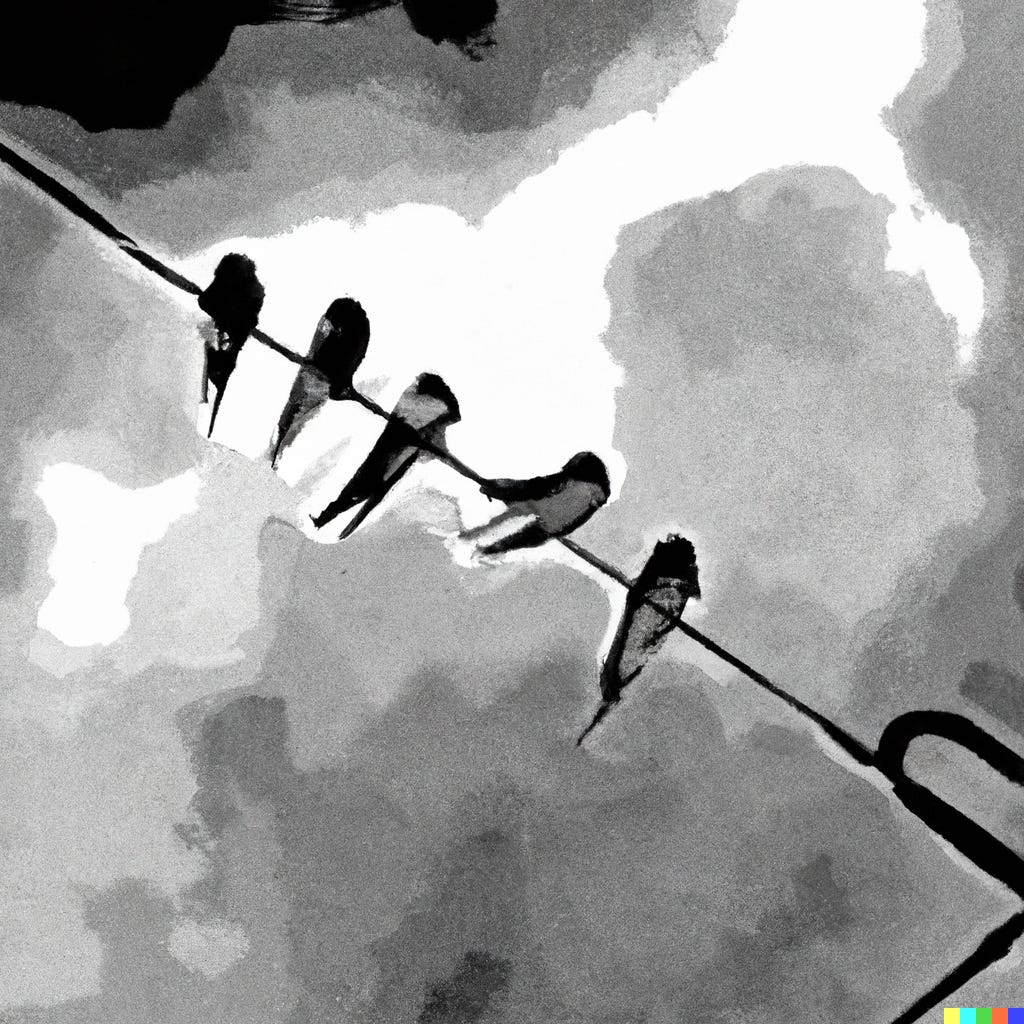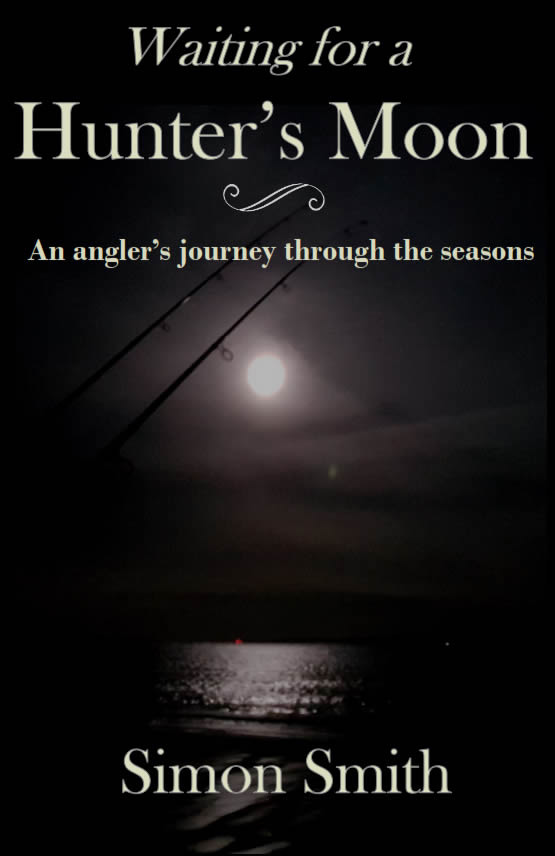A scream burst the silence last night, echoing from tile to mirror, wall to door and on through the ground floor of the house, probing with a needle point shrillness that pierced the heart and the gut. My daughter shrieked again: “Daddy! Daddy! Come quickly!”

Sprinting to bathroom, my mind was racing; what was wrong? Strange noises outside, perhaps? A pale face peering in at the window? I burst through the door to be confronted with my daughter’s terrified face and…a house spider. Admittedly, it was a leggy beast, but it didn’t put up much of a challenge as I picked it up and popped it out through the back door.
“Weather’s turning,” the old wives would say; “they’re looking for somewhere warm to sleep.” I don’t think it’s sleeping that’s on their minds, but I think there’s some truth that the weather’s about to take a turn, though it doesn’t look that way at the moment.
The day began unexpectedly early, the dawn chorus barging its way through the open bedroom window. First, a stonechat kik-kik-kick started proceedings, rapping out its desire to enter my morning. Its short shift done, it then moved over for a wren to take its turn, doing its best to soothe the situation, its song somewhat more pleasant to the ear.
Time to get up. If the weather was good enough to get the birds so enthusiastic, it was high time I stepped out and took a look for myself.
When I did finally look outside it was indeed glorious, but it felt somewhat like I’d stepped back in time. Everything had been mottled in the colours of a Victorian country parsonage, complete with the displays of flora and fauna that proliferate in every niche. Plants hung heavy under the cobwebby stillness of the day like dusty old damask curtains in a forgotten bedroom, and everywhere there were varying shades of vermilion, deep green, coppery burnt orange and teak browns.
I stepped out into the garden to get a closer look and, turning back round to grab my coffee, there they were: three orb weavers, much more brazen than their housebound cousins, exactly where they had unpacked themselves like tinkers in the night, attaching their anchor lines to the guttering just above the back door. Shiny as brass tacks, they seemed to hover casually at eye level, coronal at the centre of their respective webs, surrounded by constellations of struggling midges.
Two had anchored the other end of their webs between the shed and the holly bush in the corner, splaying across the planted border in a gossamer V, twin watchmen for whatever might fly past.
Two steps to the right brought about a beautiful change of perspective as the three webs slowly lined up almost perfectly behind one another, the same fractal image thrown across different sections of a broken mirror. Quite an apt image really, as it’s very much a time of reflection now.
I had thought that the summer had already died. September arrived and brought with it low pressure systems, bands of rain and a drop in temperatures. Returning to work after the summer holidays, within the first few days I had already christened my new winter jacket.
But here we are, October and…
Tsss! The cider bottle opens with an admonishing tut, as though to tell me that such indulgence at eight in the morning is plainly not a good idea. Not to worry. I slide the open bottle along the kitchen worktop with the other ingredients: four ounces of plain flour; two of wholemeal; baking powder; sugar; butter; eggs and apples.
The irony is not lost on me – cooking a Harvest cake with ingredients I’ve bought in a supermarket. Living within a hundred and fifty yards of the front door of one of the “big four” supermarkets makes for lazy shopping habits and a life of convenience. In fact, for the most part, there’s not much opportunity around here to actually harvest any such ingredients. Aside from a few blackberries and cherries, we are forced to rely on the shops for everything these days. Still, we must make the best of it. Everything is mixed together, poured into the tin and, in just over an hour, supermarket ingredients or not, there will be a Harvest cake plated up and ready to eat.
Harvest is one of my favourite times of year. Just the mention of the word conjures to mind distant memories of carrier bags filled with tins and packets that would be piled up in the school hall. Daily we would watch the stack grow as we spent our days drawing wheat sheaves and writing poems about crops and weather before gathering in the hall to belt out hymns like ‘We plough the fields and scatter’ and delivering hampers of our collected goodies to various elderly folks in the area.
Although this doesn’t seem to be as prevalent in our schools of late, some residual awareness of these agricultural seasons lives on in less rural areas. I for one am grateful that my interest in sea angling has given me both knowledge and awareness of the changing seasons, something that I later also found deeply rooted within the liturgical year. And so there will just be time for me to take the cake from the oven to cool, and to clean up before going off to the Benefice Harvest Mass.
The organ’s already playing as I approach the doors, and almost unavoidably, I am struck with the reversal of this whole process. I think of those peasant labourers and yeoman farmers who would have brought the fields and the crops, the bread and the wheat sheaf into their country churches to fill the aisles with the relief and plenty of the Harvest season. Now, of course, the reverse is true. The sense of bounty is all in relation to how full the shop shelves are; all the necessity of prayer and anxiousness far removed from this time of year for most people. Yet still the churches open their doors and pour out their music and prayer, offering something back to the modern world from the storehouses of worship they have stocked over the centuries. The Mass begins with ‘Come Ye Thankful People, Come’, an old favourite from my school assembly days, immediately cocooning me in that strange sense of the half-familiar that is at once comforting and yet somehow renews the original memory as it taps into the past, both distant and more recent.
Father Rhun begins his sermon, relating the story of a fisherman encouraged to expand his fleet and become more business-like so that he can expand further still and so, eventually, retire in luxury. I recognise it as a reworking of section 22 of Traherne’s first Century in which Pyrrhus, the King of Epire intends to go out and conquer half the world so that he may return home triumphant, to spend his days enjoying himself at home. In Father Rhun’s story, the fisherman turns the questions upon his interrogator: “Why should I go out and do that?”
“Why”, replies the man, “so that you can retire and sit here, relaxing and enjoying yourself”.
“And what do you think I’m doing now?” responds the fisherman.
It is a good story, and well chosen, both for the time of year and for the age in which we live. I agree that our society seems never to be satisfied without having the latest thing, the newest, fastest, shiniest, most expensive gadget. John Clare, one of the writers I most associate with this time of year, would have agreed too; his hatred of the ways in which modernisation and progress changed tradition, sentiment and the countryside he so loved looming large in mood and word throughout his days.
The Mass ends and we walk out into the early autumn sunshine. St. Luke has clambered his way back from the gospels to give us the rather Bacchanalian excess of his little summer, transforming everything into a living paragraph that could have been lifted from the pages of Adrian Bell or Laurie Lee. It’s a beautiful day and I have lots of time to spare: Time perhaps for tea and a slice of that cake and then, I think, time enough for a few hours of fishing.
I’d said I would pack up ten minutes ago. While I’ve got the afternoon free, I really should clean out the gear after a long and indulgent summer season, but though some days lumber on through their hours and others just stop like an old clock, a handful, like this one, as though just to prove time’s relative elasticity, stretch on for a bit longer. If my encounter with those spiders this morning meant anything, and if this really is a time of reflection, of looking in nature’s mirror, then like some teenager back and forth in two minds in front of that mirror, I must put up with a fair degree of indecisiveness in this month that’s retrospective and forward-facing at the same time. This is echoed in my choice of tackle or, rather, my lack of choice, for I seem to have tipped out the shed and brought all of it.
Today I have tried legering, spinning, feathering and float fishing, all of which have offered up various results. Nothing much to the spinning or feathering rods but it was fun to watch the float slide gently away a few times due to the attentions of small pollack and school bass. Now I’m at last knockings, or perhaps last-but-one knockings, having reduced everything down to just one bottom-fished rod. All day it’s been picking up random scraps – a random flounder here, an eel there and, an hour ago, a beautiful red gurnard that came flaming out of the water. Now it’s rapping again. Nothing big, but its insistence continues. Seeing as bringing it in would mean the end of the session I’ll leave it out a little longer. There’s always a little time yet – there it goes again – to soak up a little more, kind of like a swimmer taking a big breath before going under again.
I know this spot very well. In fact, as I’m sitting here, I can see a hundred other sessions happening, most of them busier than this one, all of them involving daydreams and thoughts of some kind, the fortunate by-products of angling that led Izaak Walton to refer to it as ‘The Contemplative Man’s Recreation’. And so, naturally, I begin to think about thinking, about all those things I pondered my way through during those sessions, from exams and girlfriends and, above all else, those many hours spent looking forward to things – being older, first beer, learning to drive, a job (and money for fishing tackle) of my own, leaving home, as though everything good were yet to come, an attitude that transferred to my fishing days. I fished hard and greedily through consecutive tides, foregoing the formality of sleep, as though it would get in the way of the next fish. Everything was about the now and about what was yet to come and, more importantly, about getting hold of it there and then.
I could never understand how the grown-ups in my life, particularly my grandparents and great aunts and uncles, were constantly looking back and reminiscing as though all the good things had already happened and should be cherished before the memory of them faded too much. Did they not realise that the past was gone, that here and now was where it was all happening? But such impatience is for the very young. Although no veteran, I have reached a stage of life in which I’m quite happy, slung between the past and the future like a hammock, letting time and action and memory roll and accumulate around me, dropping in from all sides.
Usually, one of my angling sessions is an organised thing. It has to be – baits, species and tides need to coincide in order to provide a relative degree of success, but here, now, there’s no need for such organisation. Sometimes we all need a cobbled-together rag-bag of a day, a proverbial loosening of the belt. Today is mine, as evidenced in the random assortment of objects scattered around me – radio, flask, sandwiches. There’s even a book for the quiet stretches and, of course, a notebook for all those thoughts about thoughts. I think that even the fisherman in Father Rhun’s story would approve of this.
A little turnstone that has been puttering around, picking little bits of bait here and there, has come back to me. He seems happy enough, like a little kid scooching in and out of the rocks, making me think of Adrian Bell’s assertion that “adult life is no more than a mock-up of the serious business of childhood”. A good assertion it is too, prompting me into action. With this in mind, I decide that there’s just enough time left for something a little different, or maybe that should read time for something completely original – the most original, in fact.
Ignoring the superfluous rods and reels and unwinding twenty or so feet of line from a spare spool, I attach a size 8 hook and a couple of shot to the end of the line. Now I’m like that stonechat from this morning, kick-kicking at a limpet, struggling to loosen it just as much as I did the first time I ever did this. Finally, a sliver of limpet meat is added to the hook and the whole lot is lowered down the side between the rocks. It doesn’t take long. Fishing like this, with a simple line running through my hands is not a million miles away from how my grandfathers would have fished here fifty years ago. Back then, when the wooden upper tier of this breakwater was intact, the town’s young men used to come down here with simple hand lines made of heavy Dacron attached to a simple brass-boomed double paternoster end rig that was swung out over the sides in search of cod. Ironic, really, that I’m sitting here surrounded by hundreds of pounds’ worth of carbon rods and reels with their engineered gears and yet I find myself tethered to old fashioned memory. In quick succession a flurry of two shore crabs and four gobies scratch the itch and flip me back into the present, back to that rattling rod that can no longer be ignored.
Maybe this is why this session is just so laid back and, well, poised between past and present. Maybe I’m not just haphazardly slung into some metaphorical hammock watching the hours pass but am balanced perfectly at that midpoint where I have as many fishing sessions left in my life as I have already used up. Maybe I’m just talking rubbish, and I have only a few dozen sessions left, or perhaps I’m lucky and have many hundreds. Time can be like this sometimes; or rather, the way we see time can be like this, so perhaps it’s better not to put too much faith in anything but the now, even if it is very fleeting. By the time you come to read this, the moment will no longer be time present but will have slipped into time long past, existing only upon this page and in my memory.
But for the time being I can assure you that I am most definitely present, enjoying the last dregs of this afternoon where I am perched on one of the rocks so that my rod reaches out over the snags in the quickly-retreating tide and the reel’s handle can rotate its steady rhythm unhindered, bringing in to me the culprit responsible for those rattles.
A gentle chill has just begun to slide in off the back of the sea as I reel in…ah, no great surprise - a tiny little whiting, the first at this back half of the year. In my palm its ragged little white outline looks just like a torn-off piece of envelope, or a hastily handwritten note perhaps, scribbled down and passed on as a reminder that winter won’t be long now.
Serialisation of ‘Waiting for a Hunter’s Moon’ by Simon Smith (with permission). This book is published by and can be purchased from Cambria Books HERE

Thanks for reading Cambria Stories! Subscribe for free to receive new posts and support my work.

